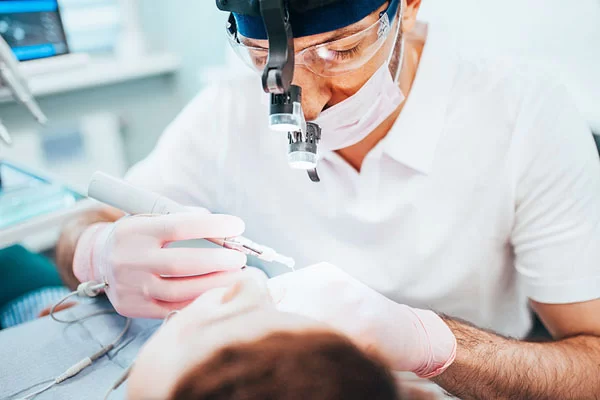Please note we may not offer this procedure at our Hilliard dental practice. Call (614) 771-6060 to learn more.
Key Takeaways
- Glass ionomer fillings release fluoride continuously, helping prevent future tooth decay and promoting natural remineralization
- These biocompatible dental materials chemically bond to your natural tooth structure, requiring minimal tooth preparation
- Ideal for pediatric patients, root surface cavities, and non-stress-bearing areas like front teeth and premolars
- Cost-effective solution ranging from $75-$200 per filling, typically covered by most dental insurance plans
- Perfect for patients seeking minimally invasive restorative treatments with proven durability lasting 5-10 years
Advanced Restorative Dentistry Near You in Hilliard
Looking for a dentist near you who specializes in glass ionomer fillings? Dr. Nathan Desai at Fishinger Dental combines cutting-edge restorative materials with personalized care to restore your oral health. Our Hilliard dental practice serves as your trusted neighborhood destination for comprehensive dental filling treatments.
Contact our experienced dentist in Hilliard today at (614) 771-6060 to schedule your consultation. We proudly serve patients throughout Columbus, Dublin, Upper Arlington, Grove City, Westerville, and surrounding Central Ohio communities.

What Are Glass Ionomer Fillings?
Glass ionomer fillings represent one of the most innovative dental filling materials available in modern restorative dentistry. These remarkable restorative materials combine glass powder with polyacrylic acid to create a unique filling material that chemically bonds directly to your natural tooth structure. Unlike traditional amalgam fillings or composite fillings, glass ionomer cements form an intimate chemical bonding with existing tooth structure, creating a tight seal that helps protect against further decay.
What makes glass ionomer particularly special is its fluoride-releasing properties. These intelligent dental materials continuously release fluoride ions into the oral environment, promoting remineralization of the surrounding tooth structure and providing ongoing protection against dental caries. This fluoride release mechanism helps strengthen healthy teeth while preventing future decay in both primary teeth and permanent teeth.
Types of Glass Ionomer Dental Materials
Conventional Glass Ionomer Fillings
Traditional glass ionomer cements represent the foundation of this restorative technology. These self-cured materials undergo an acid-base reaction that creates strong chemical bonding to moist tooth structures. Conventional glass ionomer fillings excel in treating cavities on root surfaces and are particularly effective for patients with high decay rates.
Resin-Modified Glass Ionomer Fillings
Resin-modified glass ionomer combines the fluoride-releasing benefits of traditional glass ionomer with enhanced strength from resin-based materials. These advanced composite restorations offer improved aesthetics and enhanced durability, making them ideal for visible areas while maintaining the fluoride release properties that promote oral health.
Compomer Fillings (Composite-Glass Ionomer Hybrid)
Compomers represent the latest evolution in glass ionomer technology, blending the best aspects of composite resin and glass ionomer materials. These hybrid restorative materials provide superior aesthetics compared to conventional glass ionomer while retaining beneficial fluoride-releasing properties essential for long-term oral health.
When Are Glass Ionomer Filling Restorations Recommended?
Pediatric Dentistry Excellence
Glass ionomer fillings have become the gold standard in pediatric dentistry due to their unique properties. These materials work exceptionally well for baby teeth because they:
- Release fluoride continuously to protect developing permanent teeth
- Require minimal tooth preparation, preserving more natural tooth structure
- Handle moisture well during placement, which is important when treating young patients
- Provide a gentle, biocompatible restoration ideal for growing children
Root Surface Cavity Treatment
When gum recession exposes root surfaces, these areas become vulnerable to dental caries. Glass ionomer cements excel at restoring decayed teeth at the gum line because they:
- Bond effectively to both enamel and dentin
- Seal tightly against the existing tooth structure
- Continuously release fluoride to prevent further decay
- Adapt well to the unique challenges of root surface restorations
Front Teeth and Non-Stress-Bearing Areas
For anterior restorations and areas that don’t bear heavy chewing forces, glass ionomer offers:
- Natural translucency that blends with existing tooth structure
- Chemical adhesion that doesn’t require aggressive tooth preparation
- Biocompatibility that promotes a healthy tissue response
- Long-term fluoride protection for vulnerable tooth surfaces
Advantages of Glass Ionomer Treatments
There are many key benefits of glass ionomer fillings:
- Fluoride Release for Ongoing Protection: Unlike amalgam fillings or gold fillings, glass ionomer materials continuously release fluoride ions, creating a protective environment that helps prevent dental caries and promotes remineralization of adjacent tooth structure.
- Minimal Tooth Preparation Required: These materials chemically bond to natural tooth structure, requiring less aggressive tooth preparation compared to traditional amalgam restorations or some composite fillings, helping preserve more healthy tooth structure.
- Excellent Biocompatibility: Glass ionomer cements are well-tolerated by oral tissues and compatible with the natural oral environment, rarely causing adverse reactions or tooth sensitivity.
- Moisture Tolerance: These materials handle moisture during placement better than many alternatives, making them ideal for challenging clinical situations and pediatric patients.
- Natural Aesthetics: Modern glass ionomer materials offer improved translucency and color-matching capabilities, providing natural-looking restorations especially suitable for front teeth.
Important Considerations of Glass Ionomer Fillings
While glass ionomer fillings offer many advantages, it’s essential to be aware of the possible drawbacks:
- Durability Limitations: While glass ionomer fillings provide excellent service, they may not match the longevity of amalgam fillings or gold restorations in high-stress areas like molar teeth.
- Placement Sensitivity: Success depends on proper moisture control during the critical setting phase, requiring experienced technique from your dental provider.
- Strength Considerations: These materials work best in non-stress-bearing areas and may require replacement more frequently than stronger alternatives in heavy-chewing zones.
The Glass Ionomer Filling Procedure
Comprehensive Examination and Treatment Planning
Your glass ionomer restoration journey begins with Dr. Desai’s thorough dental examination. Using advanced diagnostic tools, we assess the extent of tooth decay, evaluate your oral health status, and determine if glass ionomer represents the optimal choice for your specific dental needs.
Comfort-Focused Treatment Approach
Patient comfort remains our top priority throughout your procedure. We offer various dental sedation options and ensure complete local anesthesia before beginning treatment. Our gentle approach helps anxious patients feel relaxed while receiving quality restorative care.
Precise Tooth Preparation
Following complete anesthesia, we carefully remove all decayed tooth structure while preserving maximum healthy tooth structure. Glass ionomer’s chemical bonding capability allows for conservative preparation, maintaining tooth strength and integrity.
Material Placement
The glass ionomer material undergoes precise mixing to achieve optimal consistency and working time. Dr. Desai carefully applies the material to achieve intimate contact with existing tooth structure, ensuring proper chemical bonding and tight seal formation.
Final Shaping and Polishing
Once the initial set occurs, we carefully contour and polish your restoration to achieve a natural appearance and a comfortable bite. The final result blends seamlessly with your natural tooth structure while providing durable, long-lasting protection.
Post-Treatment Care Instructions
After your anesthesia wears off, we provide detailed instructions for optimal healing and restoration longevity. Proper oral hygiene practices and regular follow-up appointments help ensure your glass ionomer filling provides years of reliable service.
Glass Ionomer Filling Costs
Glass ionomer fillings offer exceptional value in restorative dentistry, typically ranging from $75 to $200 per restoration. These costs compare favorably to other dental filling materials:
- More affordable than composite fillings or gold restorations
- Competitive with amalgam filling costs while offering superior aesthetics
- Excellent insurance coverage through most dental insurance plans
Several factors influence your total investment:
- Size and location of the cavity requiring treatment
- Complexity of the restoration procedure
- Your dental insurance coverage and benefits
- Type of glass ionomer material selected for optimal results
Our team works closely with your dental insurance provider to maximize your benefits and minimize out-of-pocket expenses. We offer flexible payment options to make quality restorative care accessible for all patients.

Frequently Asked Questions
How long do glass ionomer fillings last near me in Hilliard?
Glass ionomer restorations typically provide five to 10 years of reliable service when properly maintained. Longevity depends on factors including the location of the restoration, your oral hygiene practices, dietary habits, and the specific type of glass ionomer material used. Regular checkups with Dr. Desai help ensure optimal restoration performance.
Are glass ionomer fillings safe for my family?
Absolutely! Glass ionomer materials are extensively tested and approved by the American Dental Association for safe dental use. These biocompatible materials are particularly well-suited for pediatric patients and those with sensitivity concerns. The continuous fluoride release actually provides additional protection for your oral health.
Do glass ionomer fillings cause tooth sensitivity?
Glass ionomer materials typically cause minimal post-treatment sensitivity compared to other restorative options. The material’s biocompatibility and chemical bonding to tooth structure usually result in comfortable, well-tolerated restorations. Any minor sensitivity typically resolves within a few days as tissues adapt.
Can glass ionomer fillings be placed in one visit?
Yes! Glass ionomer restorations are completed in a single appointment at our Hilliard practice. The entire procedure, from preparation through final polishing, typically takes 30-60 minutes, depending on the restoration’s size and complexity.
Schedule Your Glass Ionomer Consultation Today
Ready to restore your smile with advanced glass ionomer technology? Contact Dr. Desai, your trusted dentist in Hilliard, at (614) 771-6060 to schedule your comprehensive evaluation.
Don’t let tooth decay compromise your oral health and quality of life. Our experienced team at Fishinger Dental is ready to help you achieve optimal oral health through proven, advanced restorative techniques. Proudly serving patients in Hilliard, Columbus, Dublin, Upper Arlington, Grove City, Westerville, and throughout Central Ohio.






